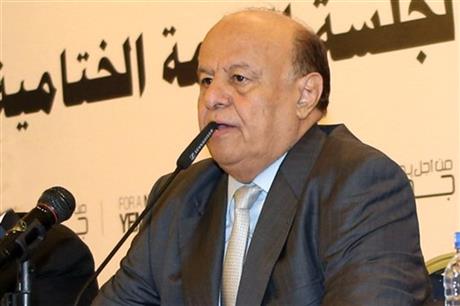
Yemen’s president resigned Thursday, saying he had reached a “deadlock” in talks with Shiite rebels who rule the capital and had confined him to his home. His resignation raised fears the Arab world’s poorest country could again split apart, severely complicating U.S. efforts to combat al-Qaida’s powerful local franchise.
Presidential officials said Abed Rabbo Mansour Hadi, a close U.S. ally in the fight against al-Qaida, submitted his resignation to parliament after being pressured to make further concessions to the rebels, known as Houthis, who are widely believed to be backed by Iran, charges they deny.
The rebels effectively control the capital Sanaa, several other cities and state institutions, but their writ does not extend to vast areas of the country that are predominantly Sunni, where its recent encroachments have fanned fears of a sectarian conflict. The Houthis could also face sanctions from the international community, which strongly backed Hadi.
Yemen also has a powerful movement in the south demanding autonomy or a return to the full independence the region enjoyed prior to 1990, which is unlikely to accept rule by the Houthis, whose power base is in the north. The Houthis are Zaydis, a Shiite minority that makes up about a third of Yemen’s population.
Hadi’s resignation came after several rounds of negotiations over a new governing arrangement that would give the Houthis more power. Many observers suggested the Houthis would keep Hadi on as a puppet to maintain the veneer of international legitimacy.
Hadi had earlier pledged political concessions in return for the rebels withdrawing from his house and the nearby presidential palace following days of clashes, but Houthi fighters remained deployed around both buildings throughout Thursday.
“We reached a deadlock,” Hadi said, according to a copy of his letter of resignation obtained by The Associated Press.
“We found out that we are unable to achieve the goal, for which we bear a lot of pain and disappointment,” he said.
Presidential adviser Sultan al-Atawani told AP that the Houthis refused to withdraw from the presidential palace, the republican palace where the prime minister lives or from the president’s house. They also refused to release a top aide to Hadi whose abduction earlier this week set the violence in motion.
Military officials close to the president said Hadi resigned after the Houthis pressured him to give a televised speech to calm the streets. They said the Houthis also requested appointments in his own office, the Defense Ministry and provincial capitals, demands Hadi rejected.
The officials spoke on condition of anonymity because they were not authorized to speak to the media.
Yemeni law says the parliament speaker — Yahia al-Rai, a close ally of ousted President Ali Abdullah Saleh — would assume the presidency. Saleh wields considerable power despite resigning in 2012 in the face of protests, and is widely believed to be allied with the Houthis.
The Yemeni government submitted its resignation earlier on Thursday, as U.N. envoy Jamal Benomar met with representatives from the Houthis and other political factions to try to implement a deal reached Wednesday to resolve the crisis.
Prime Minister Khaled Bahah’s technocratic government was formed in November as part of an earlier United Nations-brokered peace deal after the Houthis overran the capital in September.
Bahah, a political independent, posted his resignation on his official Facebook page, saying he had held office in “very complicated circumstances.” He says he resigned in order to “avoid being dragged into an abyss of unconstructive policies based on no law.”
“We don’t want to be a party to what is happening or will happen,” he added.
Yemeni analyst Farea al-Muslimi described the resignations as a “smart” move by Hadi and Bahah, saying it would deepen the Houthis’ isolation both inside the country and internationally.
“The resignations will spark popular anger in the street,” he said.
The resignations mark the end of an internationally-backed transition that compelled Saleh, an autocrat who ruled for three decades, to resign in 2012 following months of Arab Spring protests.
Hadi’s rule was deeply undermined by Saleh loyalists who retained posts in state institutions and the security apparatus. Last year the U.N. Security Council imposed targeted sanctions on Saleh and two top Houthi leaders, accusing them of obstructing the political transition.
Yemen is home to al-Qaida in the Arabian Peninsula, which Washington has long viewed as the terror network’s most lethal affiliate. The group has mounted a number of failed attacks on the U.S. homeland and claimed responsibility for the Paris attack on a French satirical magazine earlier this month.
The United States has provided extensive counterterrorism training and support to Yemeni government forces and has carried out drone strikes targeting al-Qaida leaders. The strikes have also killed civilians, fanning popular outrage.



